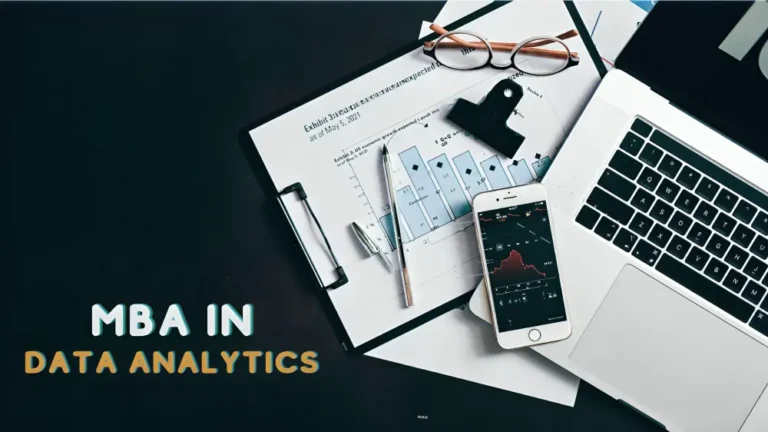MBA in Accounting: Key Benefits, Career, and More
For those who want to pursue a career in accounting, finance, or corporate leadership, an MBA in Accounting is a specialized degree. This advanced degree gives students a unique skill set that is highly sought after in today’s competitive job market by fusing specific accounting knowledge with the principles of business administration. An MBA in accounting offers the groundwork for success whether you want to launch your own company, work in corporate finance, or take on a managing position.
MBA in Accounting Overview
| Course Level | Post-graduation |
| Full Form | Master of Business Administration in Accounting |
| Duration | 2 years |
| Examination Type | Semester-based |
| Eligibility | Bachelor’s degree in any discipline with a minimum of 50% score |
| Admission Process | Entrance Exam based |
| Average Course Fee (INR) | INR 4,00,000 to INR 10,00,000 |
| Average Salary Package (INR) | INR 8,00,000 to INR 20,00,000 |
What is an MBA in Accounting?
The fundamental business administration courses of a conventional MBA program, including management styles, operational systems, and leadership abilities, are covered in an MBA in accounting program. This implies that students acquire all-encompassing business abilities that will help them in their future employment, no matter where they finish up. Additionally, it gives the accounting course electives a specific focus, qualifying students to become certified public accountants (CPAs) if they so choose.
Eligibility
- The candidate may also benefit from recommendation letters.
- Taking advanced math classes, particularly in calculus and statistics, might increase one’s chances of getting chosen.
- Admission is open to students with a bachelor’s degree in any field, ideally business, accounting, or business administration with a focus on accounting, and a minimum score of 50% or above.
- A candidate’s degree of professional experience may be examined by certain institutions. An average of two to three years of experience is required, however, these levels differ depending on the school.
Why Choose MBA in Accounting?
Increased Salary: Among the many marketable skills that an MBA offers are strategic planning and leadership. As of April 2022, MBA graduates in accounting and finance earn USD 20,000 more annually on average than accountants with bachelor’s degrees, according to Payscale.
Job Diversity and Security: MBA programs in accounting frequently have a marketing, business, and finance focus. Graduates of this higher education often have access to a wide range of professional employment options.
Certification Preparation: Students pursuing an accounting master’s degree are prepared for a profession as certified public accountants (CPAs). Other certificates, such as management accounting or internal auditing certificates, are also available to the graduate.
Types of MBA in Accounting
Full-Time MBA in Accounting Courses: Those who want to pursue a full-time MBA in Accounting are required to participate in class activities, turn in assignments, attend regular courses, and take offline tests on campus. They must carefully adhere to the course syllabus. Students who participate full-time get a great deal from in-person interactions with peers and teachers in the classroom as well as numerous networking possibilities.
Part-Time MBA in Accounting Courses: A part-time MBA in accounting is an option for students who are unable to commit to full-time MBA programs. In addition to receiving the full benefits of the MBA program, this allows them to live out their professional lives. The length of the course, however, can be a bit longer than normal.
Distance/Online MBA in Accounting Courses: The ability to pursue an online or distance learning MBA in accounting from any place is its primary advantage. The program is specifically created for individuals who are unable to attend full-time or part-time MBA programs, and it takes two to three years to finish.
Admission Process
The results of the qualifying degree will be used to determine admission to the two-year MBA in Accounting program. Colleges will create a list of applicants based on their individual bachelor’s degree ratings. The chosen applicants will be contacted for a group discussion and an in-person interview. To get admitted to any college that offers an MBA in Accounting, candidates must do well in both rounds. The candidate might visit the college to verify their acceptance after being chosen.
MBA in Accounting Syllabus
| Basics of Marketing | Management Information Systems |
| Financial Management | Entrepreneurship Development & Project Management |
| Human Resource Management | International Business Management |
| Information Technology | Research Methodology |
| Legal Aspects of Business | Materials & Logistics Management |
| Management Accounting | Financial Management |
| Management Information Systems | Business & Environmental Management |
| Managerial Communication | Economic Environment of |
| Managerial Economics | Human Resource Management |
| Manufacturing & Operations Management | Current Trends in Management |
| Marketing Management | Business & Environmental Management |
| Materials & Logistics Management | Economic Environment of |
| Organizational Behavior & Principles & Practices of Management | Marketing Management |
| Research Methodology | Manufacturing & Operations Management |
How to Get Admission for MBA in Accounting?
- Students need to verify their qualifying requirements. In addition to examining the costs of the MBA Accounting course, it’s crucial to review the curriculum, course syllabus, and placement prospects.
- They can then take an admission exam such as the CAT, MAT, XAT, SNAP, GMAT, etc. if they are happy with the way the course is structured. They need to confirm that these test results will be accepted by the colleges to which they wish to apply.
- Based on test results and prior academic credentials, colleges will compile a list of applicants. They will then be contacted for additional rounds of selection.
- The chosen applicants will need to finish the admissions requirements.
Conclusion
With a combination of accounting knowledge and business administration abilities, an MBA in accounting gives students access to a wide range of job options in corporate leadership, entrepreneurship, and finance. Higher earning potential, career security, and preparation for CPA certification are all benefits of this degree. It offers a flexible route for professional progression in the cutthroat job market, whether it is pursued online, part-time, or full-time.





